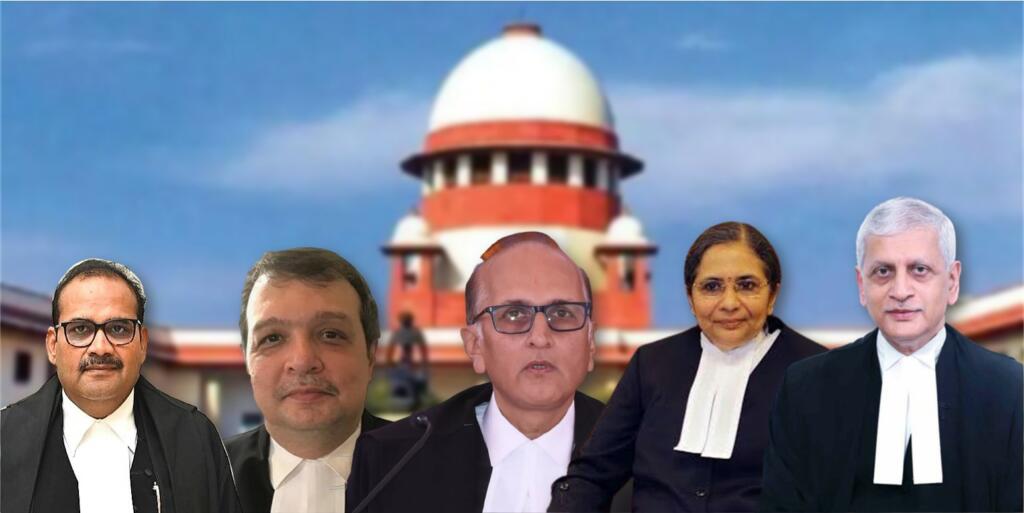The betrayal of the contours of the Constitution of India is appalling, unconscionable or rather unscrupulous travesty of the quintessence of equal justice. The sole fountainhead at the centre of this debate pertains to the legality of the EWS Quota in light of the Indra Sawhney judgement of 1992.
Janhit Abhiyan vs. Union of India: Debate flanking the EWS Quota
Catechizing the time span of the reservation policy, Hon’ble Justice Bela M. Trivedi made a strong observation in the EWS Judgement. She was of the view that no document can be perfect and no ideals can be fully achieved. But this does not mean that we as a society should be bereaved of our ideals and visions.
The Hon’ble Justice found the ideals envisaged by the framers of our Constitution to have an egalitarian, casteless and classless society is an achievable goal.
She categorically highlighted that the reservation structured singularly on economic criteria does not violate any essential feature of the Constitution of India and does not cause any damage to the basic structure of the Constitution of India.
Basic premise of the 103rd Constitutional Amendment Act, 2019
The economically weaker sections of citizens belonging to the Unreserved Category were not eligible for the benefit of reservation. Therefore, with a view to fulfil the ideals lying behind Article 46, and to ensure that the aforementioned class gets a fair chance of receiving higher education and participation in employment in the services of the State, the Central government amended the Constitution of India.
Prior to the 103rd Constitutional Amendment Act, the economically weaker sections of the Unreserved Category had largely remained excluded from attaining the higher educational institutions and public employment on account of their financial incapacity to compete with the persons who were economically more privileged. The benefits of existing reservations under Clause (4) and (5) of Article 15 and Clause (4) of Article 16 are generally unavailable to them unless they meet with the specific criteria of social and educational backwardness.
It has been further stated that the Constitution (Ninety-third Amendment) Act, 2005 which paved way for the incorporation of Clause (5) to Article 15 along with Clause (4) to Article 16 of the Constitution were necessarily restricted to backward class of citizens only.
Therefore, the Exclusion of the backward classes covered by purview of Articles 15(4), 15(5) and 16(4) from getting the benefit of reservation as economically weaker sections, is nothing more than the nature of balancing the requirements of non-discrimination. The compensatory discrimination to the EWS does not violate the Equality Code and also does not in any manner cause damage to the basic structure of the Constitution of India.
Janhit Abhiyan vs. Indra Sawhney?
The landmark judgement of Janhit Abhiyan vs. Union of India, popularly known as the EWS Quota Case, uploads the validity of the reservation provided to the economically weaker sections of citizens up to ten per cent. The said judgement does not in any way contradict the ruling of the Hon’ble Apex Court in the 1992 historic judgement of Indra Sawhney vs. Union of India.
The majority view of the bench in the Janhit Abhiyan case underline the premise that the EWS reservation does not amount to breach of the ceiling limit of fifty per cent, as the ceiling limit itself is not inflexible. The court categorically highlighted that the fifty per cent ceiling limit provided under the Indra Sawney case would be limited to the reservations envisaged by Articles 15(4), 15(5) and 16(4) of the Constitution of India i.e., with respect to the backward class of citizens.
The 103rd Constitution Amendment Act therefore permits the State to make special provisions, including reservation, based on economic criteria and in no way be termed as an infringement of the basic structure of the Constitution in excluding the SEBCs/OBCs/SCs/STs from the scope of EWS reservation.
Therefore, the inclusion of any class or section that is economically disadvantaged and falls under the description of a weaker section can be termed as an instrument of affirmative action by the State to meet the ends of an egalitarian society.
The erudite, intellectual and authoritative opinions pronounced by the 5-Judges Bench in this historic judgement, fulcrum towards upholding the constitutional validity of the 10 per cent EWS Quota with a 3:2 split verdict.
Also Read: Supreme Court tells Modi govt. to declare religious conversion illegal
Constitutional Idea of Equality
The basic skeleton of the constitution or the idea and identity of equality inculcates the outlook against discrimination in any form, for any reason whatsoever on the proscribed grounds. Consequently, the provision for affirmative action is an intrinsic part of the framework and value of equality, that is, to ensure that the equality of classes hitherto discriminated and ostracized.
However, the idea of equality as envisioned by the framers of the Constitution was sought to be achieved on the completion of fifty years of the advent of the Constitution. That is to say the policy of reservation that must have achieved its purpose has failed the test of time. However, at the end of seventy-five years of our independence, we need to revisit the system of reservation in the larger interest of the society as a whole, as a step forward towards transformative constitutionalism.
Support TFI:
Support us to strengthen the ‘Right’ ideology of cultural nationalism by purchasing the best quality garments from TFI-STORE.COM
Also Watch:
https://www.youtube.com/watch?v=PyAnhsFANis
